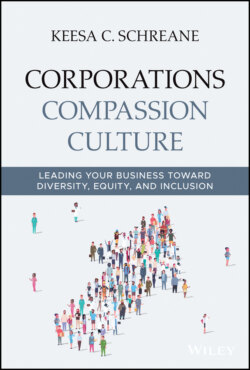Читать книгу Corporations Compassion Culture - Keesa C. Schreane - Страница 23
Chapter 1 Takeaways
Оглавление
Compassion in business means inspiring employees and others in the business ecosystem to bring their best work, their highest intelligence, and their greatest level of creativity and enthusiasm.
Compassion needs to accompany inclusion and equality for workers to feel comfortable enough in their environments to think and act creatively and confidently, driving revenue generation.
Compassion complements inclusion and equality. All three are needed for business to evolve, continue its role as a driver of innovation in society, and generate revenues.
Inclusion, equality, and compassion have not traditionally been at the heart of business (nor of society in general). But times have changed, and a lack of compassionate culture can be the downfall of 21st-century businesses.
Workers and others in the business ecosystem have begun slowly course-correcting this flaw in old school business culture. This is an essential evolution, particularly after social changes resulting from COVID-19 and BLM.
Innovation and growth do not need to come at the expense of compassionate treatment of employees.
One way leaders and corporations falter is refusing to allow equality, inclusion, and compassion into their enterprises. This usually happens when they desire greater wealth than the nearest competitor by any means, lower employee pay, and neglect accountability. Milton Friedman's 1970s declaration solidified this construct into gospel.
Compassion, unlike philanthropy, is neither a separate subsidiary nor a spin-off. It is a behavior that must be a part of the business culture.
Andrew Carnegie is an iconic business titan of American history (that is, a powerful, wealthy, philanthropic enterprising White male). And yet, he is a great example of what can happen when a successful, well-known business leader makes a poor decision. Even if a corporate culture progresses and profits from unethical tactics, those tactics and activities result in mistrust that neither the employee nor the marketplace (that is, the customer) forgets.
When the corporation suffers, the shareholder ultimately suffers.
Historically, society has done a poor job recognizing accomplishments of individuals from underrepresented and underestimated groups who lead and govern with equality, inclusion, and compassion. This is changing. Highlighting these narratives is way overdue.
